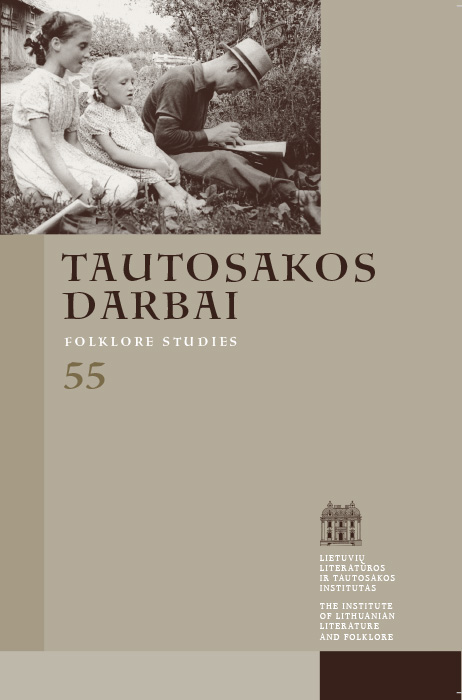Paprasti laiškai: kontekstinio tyrimo metodika
Santrauka
Šis straipsnis yra kilęs iš poetės Janinos Degutytės epistolinio palikimo tyrimo. Tai laiškai, kuriuos, praėjus ne vieniems darbo metams, žiūrint iš rašymo antropologijos perspektyvos, galima pavadinti paprastais. Paprastumas šiuo atveju anaiptol nereiškia trūkumo, tik ypatybę. Ypatybę, kuri užduoda šiam tyrimui linkmę, keldama specifines kontekstinio tyrimo metodikos užduotis. Tai metodika, kuri kuriama indukciniu būdu.
Paprasto rašymo ypatybe poetės laiškai įsilieja į platų paprastų žmonių laiškų lauką. Matomi buvusio abipusio susirašinėjimo visumoje. Nors ir nuskirtinami, jie nėra sulyginami, nes kaip tik jie – paprasti Degutytės laiškai sudaro galimybę paprastų žmonių laiškams pasirodyti.
Atsisiuntimai
Nėra atsisiuntimų.
Skaitomiausi šio autoriaus(ų) straipsniai
- Giedrė Šmitienė, Neringa Markevičienė, Raštų, kaip ir laiškų, nepasirenki – jie tave ištinka. Paskelbus Balio Sruogos laiškus iš Štuthofo , Tautosakos darbai: T 68 (2024): Tautosakos darbai
- Giedrė Šmitienė, Tarprūšinė patirtis sergant. Antropologinė prieiga prie kelių Janinos Degutytės tekstų , Tautosakos darbai: T 64 (2022)
- Lina Būgienė, Giedrė Šmitienė, Jurga Jonutytė, Janinos Degutytės laiškų leidinį pasitinkant , Tautosakos darbai: T 69 (2025): Tautosakos darbai
- Giedrė Šmitienė, Jurga Jonutytė, Pratarmė , Tautosakos darbai: T 68 (2024): Tautosakos darbai
- Rūta Latinytė, Giedrė Šmitienė, Vaiva Aglinskas, Irena Žilienė, Informacija , Tautosakos darbai: T 68 (2024): Tautosakos darbai
- Giedrė Šmitienė, Neakivaizdinis pokalbis su Maurice’u Merleau-Ponty. Tradicinės kultūros tyrimas juslinio suvokimo plotmėje , Tautosakos darbai: T 47 (2014)
- Giedrė Šmitienė, Linkėjimai čia visomis progomis tie patys – laisvės ir namų. Kazimieros Kairiūkštytės-Galaunienės laiškai iš tremties (1953–1955) , Tautosakos darbai: T 53 (2017)
- Giedrė Šmitienė, „Man visa lengva“: etnologinis sąmonės tyrimas , Tautosakos darbai: T 53 (2017)
- Giedrė Šmitienė, Trys laiškai apie laisvę ir mitus , Tautosakos darbai: T 53 (2017)
- Giedrė Šmitienė, Janinos Degutytės žemės patirtis , Tautosakos darbai: T 54 (2017)
